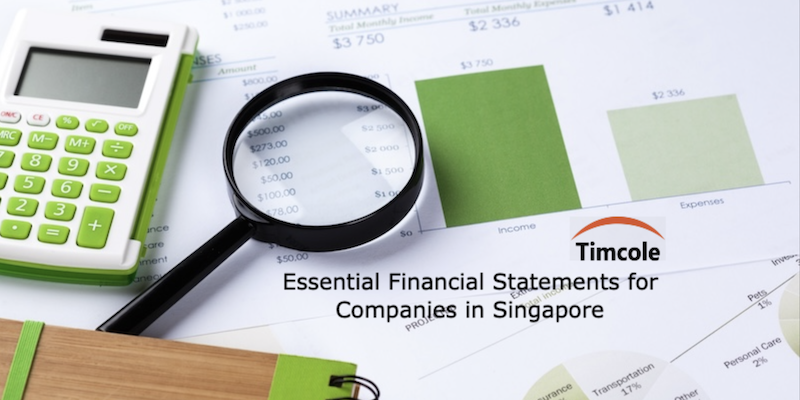In the dynamic world of business, financial statements are the compasses guiding companies through the turbulent seas of commerce. Financial statements are formal records that present the financial activities and position of a business, organization, or individual. They provide a summary of financial transactions, performance, and financial health over a specific period, typically a fiscal quarter or year. These statements are crucial tools for stakeholders, including investors, creditors, management, and regulatory bodies, to assess the financial performance, profitability, liquidity, and solvency of an entity.
In Singapore, a global financial hub renowned for its robust regulatory framework and business-friendly environment, companies are required to prepare several key financial statements to ensure transparency, accountability, and compliance. Let’s delve into the different financial statements for companies that they need to prepare in Singapore to stay compliant and file their annual returns.
Different Financial Statements that Companies Need to Prepare in Singapore
Balance Sheet:
The balance sheet is akin to a financial snapshot, capturing a company’s financial health at a specific moment. It delineates the company’s assets, liabilities, and equity, offering a comprehensive view of its financial position. Assets encompass everything a company owns or has a right to, such as cash, inventory, property, and equipment. Liabilities represent obligations owed by the company, including loans, accounts payable, and accrued expenses. Equity reflects the residual interest in the company’s assets after deducting liabilities and represents the shareholders’ ownership stake. In Singapore, balance sheets must comply with either the Singapore Financial Reporting Standards (SFRS) or the Singapore Financial Reporting Standards for Small Entities (SFRS for SE), ensuring consistency and comparability in financial reporting.
Income Statement:
The income statement, also known as the profit and loss statement, is a vital tool for assessing a company’s financial performance over a defined period. It delineates revenues earned, expenses incurred, and resultant profits or losses. Revenues encompass income generated from the company’s primary operations, while expenses encompass costs incurred to generate revenue, such as operating expenses, depreciation, and interest expenses. The income statement provides insights into a company’s operational efficiency, revenue-generating capacity, and overall profitability. Like the balance sheet, the income statement in Singapore must adhere to the SFRS or SFRS for SE, ensuring consistency and transparency in financial reporting.
Cash Flow Statement:
The cash flow statement provides a comprehensive overview of how cash moves in and out of a company during a specific period. It comprises three main sections: operating activities, investing activities, and financing activities. Operating activities encompass cash flows from the company’s primary business operations, such as revenue collections and payments to suppliers. Investing activities encompass cash flows related to the purchase and sale of long-term assets, such as property, plant, and equipment. Financing activities encompass cash flows related to the company’s financing activities, such as issuing or repurchasing equity or debt securities. The cash flow statement is crucial for assessing a company’s liquidity, solvency, and ability to meet its short-term obligations.
Statement of Changes in Equity:
The statement of changes in equity tracks the changes in a company’s equity over a specific period, reflecting transactions with shareholders and distributions to them. It encompasses changes in retained earnings, share capital, and other reserves. The statement of changes in equity provides insights into how a company’s equity position evolves over time, reflecting capital injections, dividends, share buybacks, and other equity-related transactions. Compliance with the SFRS or SFRS for SE is mandatory for this statement, ensuring transparency and consistency in reporting equity-related transactions.
Notes to the Financial Statements:
Accompanying the primary financial statements are the notes to the financial statements, which provide additional information and disclosures essential for understanding the company’s financial position and performance. These notes elucidate accounting policies, contingencies, significant accounting estimates, and other pertinent details that may impact the interpretation of the financial statements. By providing context and explanations for the figures presented in the primary financial statements, the notes enhance transparency and enable stakeholders to make informed decisions based on a comprehensive understanding of the company’s financial affairs. Compliance with the SFRS or SFRS for SE extends to the notes to the financial statements, ensuring consistency and completeness in financial reporting.
Regulatory Compliance and Reporting Standards
In Singapore, companies are mandated to adhere to the Financial Reporting Standards (FRS) issued by the Accounting Standards Council (ASC). The ASC oversees the development and implementation of accounting standards in Singapore, ensuring consistency, transparency, and comparability in financial reporting.
Conclusion
In Singapore’s vibrant business landscape, the preparation of comprehensive and accurate financial statements is imperative for fostering investor confidence, facilitating informed decision-making, and ensuring regulatory compliance. By meticulously preparing and presenting balance sheets, income statements, cash flow statements, statements of changes in equity, and accompanying notes in accordance with the prescribed standards, companies can navigate the complexities of the financial terrain with confidence and clarity.
Through transparent financial reporting, companies in Singapore uphold the principles of accountability, integrity, and transparency, thereby contributing to the resilience and sustainability of the nation’s economy.
Additionally, corporate service providers play a pivotal role in assisting companies with their financial reporting obligations. These providers offer expertise in accounting, compliance, and regulatory matters, helping companies streamline their financial processes and ensure adherence to Singapore’s stringent reporting standards. By engaging the services of a reputable corporate service provider, companies can access professional support to enhance the accuracy, reliability, and efficiency of their financial reporting efforts, ultimately bolstering their reputation and credibility in the marketplace. As trusted partners, corporate service providers enable companies to focus on their core business activities while navigating the intricacies of financial management with confidence and peace of mind.








